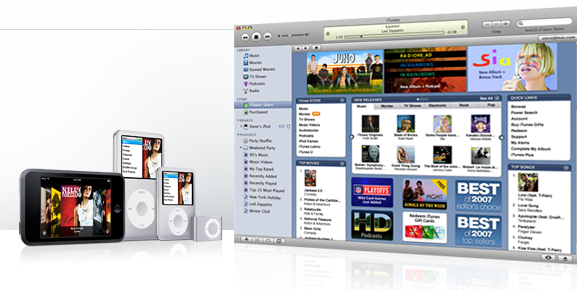The geeks were right; music labels bow to technology
In a week that saw EMI hire a former file sharer, the labels help launch a service that encourages people to share music, and Apple become the country's largest retailer, the only thing that can be said is technology reigns supreme in the music industry.

Some of you out there can pat yourselves on the back. You've been shouting for years on Web sites, message boards, and blogs that the music industry would one day bow to technology.
That day has most certainly arrived.
Take a second to gaze out over the music landscape. Technology reigns supreme. Not only have the four largest record companies begun killing off digital rights management and adopting unprotected MP3s, but this week they sidled up to file sharing like never before. There isn't any question that the labels have raised a white flag after being overwhelmed by the digital age and the desire of fans to share songs.
Consider that this week the EMI Group hired Douglas Merrill, Google's former Chief of Information, to run the label's digital unit. He is a self-described geek and former file sharer. He has no previous music-biz experience. "There's a set of data that shows that file sharing is actually good for artists," Merrill told me on Wednesday during a phone interview.
A year ago, you would have never heard a music exec utter such a thing.
On Thursday, MySpace Music was announced. This is the music service that the big record companies started with News Corp. to allow fans to buy downloads, listen to streaming music, and yes, by God, share music. MySpace users won't be sharing files, but they will be passing music to one another a la social networking.
And which retailer is sovereign over music sales? I'll give you a hint. It's not Tower Records or Sam Goody (both defunct). It's not Target, Amazon, or Wal-Mart. Not anymore.
The No. 1 music retailer in the land is Apple's iTunes, an online store and dealer of digital music. How do you like them apples?
But this isn't the time to gloat. The digital music revolution is in its infancy. Nobody knows what works yet.
In our an interview, Merrill said that a winning business model hasn't been found, and that's what he's after.
"I think there are going to be a lot of different models," said Merrill, who starts his job as president of EMI's digital arm on April 28. "You can imagine supporting music through relevant targeted ads, the Google model. There are a dozen other things... We should try them all. We should see what the data says and whatever it says, we should follow the data, and follow our users, and let them help guide us. We should engage in a broad conversation about art."
How this plays out is anybody's guess. In the near term, we're likely to see more job cuts and shrinking revenue in the sector as we transition into what Forrester Research analyst James McQuivey calls Music 2.0. The reality is that recorded music will probably never produce the kind of revenue it once did. Digital technology has degraded the value.
There's nothing that says the labels will be part of the final equation, but I wouldn't bet against them--especially if they continue to embrace new technologies and business models. They've got lots of money. They still know how to find and create stars.
But the record companies are going to have to morph into smaller entities that represent fewer acts and then oversee their total output: music, video, concerts, and merchandise. This is the model that Live Nation is using to attract major artists, including Madonna, U2, and Jay-Z.
I say long live Music 2.0.

